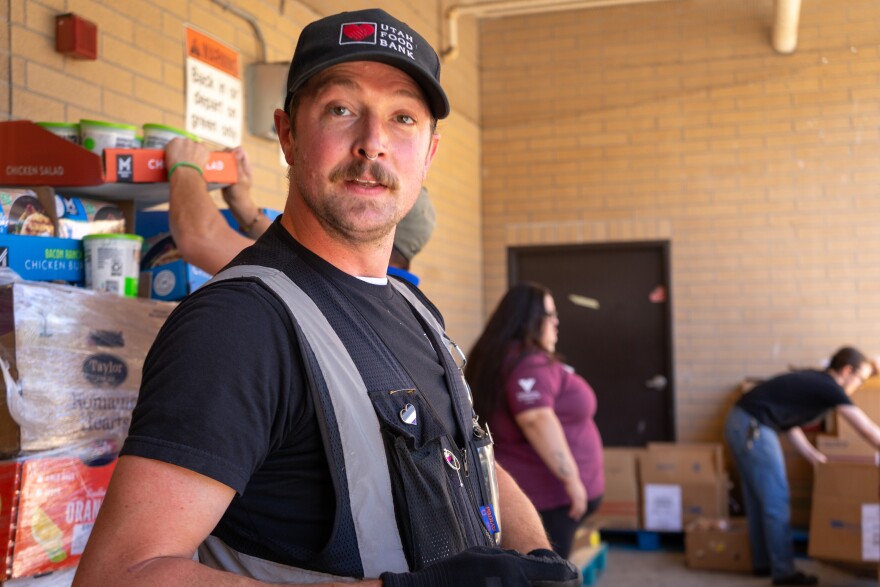Some Utah grocery stores have too much food on their shelves. As products approach their sell-by date, even with hefty discount stickers, some perfectly good groceries stay unsold.
That’s where Jaymes Pryor comes in.
He works as a driver for Grocery Rescue at the Utah Food Bank. The program recovered more than 20 million pounds of food in 2024, accounting for about 30% of the food bank’s meals. Pryor called himself an “ethical Robin Hood" for the way he redistributes gifts from huge corporations to the people who need them.
“It's so efficient,” Pryor said. “We go from the stores right to the pantry or the agency.”
The program gets groceries directly to kitchen tables or food pantries — with no wait period.
When Pryor opened his refrigerated truck in a West Jordan parking lot, it smelled of fresh peaches and cardboard. Thanks to one wholesale store on his route, that’s most of what he’d collected that morning.
“Some days it's a couple boxes,” he said. “And then other days you get over a thousand pounds of peaches.”

Pryor must move quickly on his route. The food is on the edge of fresh, and is served within 24 hours of pick up.
“A lot of the stores are really good about freezing it,” he said. “That's the best. Little fresher for the people. But we'll take it either way. As long as it's not getting fuzzy.”
But if he misses a pickup time, or if perishable goods are improperly stored, all of that food goes to waste. Pryor said the hardest part of his job is when groceries are donated that can’t be eaten, like thawed meat, rotten fruit or even garbage thrown into the donation bin.
“If I noticed that that box of bananas is kind of liquid, I'm not going to pick that up, man,” he said.
It frustrates him because he believes in the mission of Grocery Rescue. He wants donations to make their way to food bank users, and he wants more people to use those resources.

“If I'm consistently having bad, careless donations, maybe I'll walk over and talk to the produce guy,” he said. “I think a big part of helping people is being able to talk to them face-to-face.”
Doing that has helped him overcome personal anxieties about talking to strangers. And he doesn’t want to hold a grudge against anyone — even those who put used water bottles in with food donations.
“I know that everybody's just doing their job, and sometimes you don't exactly get the support you need from the organization you work for,” he said. “I think it can make it really hard to see past your own stuff.”

Criss-crossing the Wasatch Front in his truck, Pryor meets people who are different from him and then connects them to each other.
“I get to be this weird bridge between all these micro communities,” he said.
Now more than ever, Pryor sees his community as divided by politics, social media and identity.
“There's a lot of unknown right now, and there are also a lot of people trying to take advantage of that,” he said. “But what I have seen consistently is that it's never as bad as it seems on the other side of your phone.”
Pryor’s job lets him break down those walls when he talks to grocery workers and food bank patrons. In his view, this focus on community is distinctly Utah.
He said it’s no secret where those values come from. Even though he’s not an active member of The Church of Jesus Christ of Latter-day Saints, Pryor knows that charity shapes the region.
“Whether it's East and West Valley or Provo to Salt Lake to Ogden,” he said, “everywhere that I've lived and spent time in Utah, there's always people willing to help other people in your neighborhood.”

At the end of his route, Pryor parked his truck at the Volunteers of America Detox Center in Salt Lake City on Redwood Road, where staff immediately helped him unload the donations. In between lifting heavy crates of milk and produce, Pryor found time to laugh and talk with the team.
He admitted that he was tired from a long morning and said that’s usually the case. But he still feels good at the end of each shift, because the job keeps him from believing that the world is full of bad people, constantly fighting with each other.
“I think it's full of good people,” he said. “And I also don't think it's hard to find them.”







